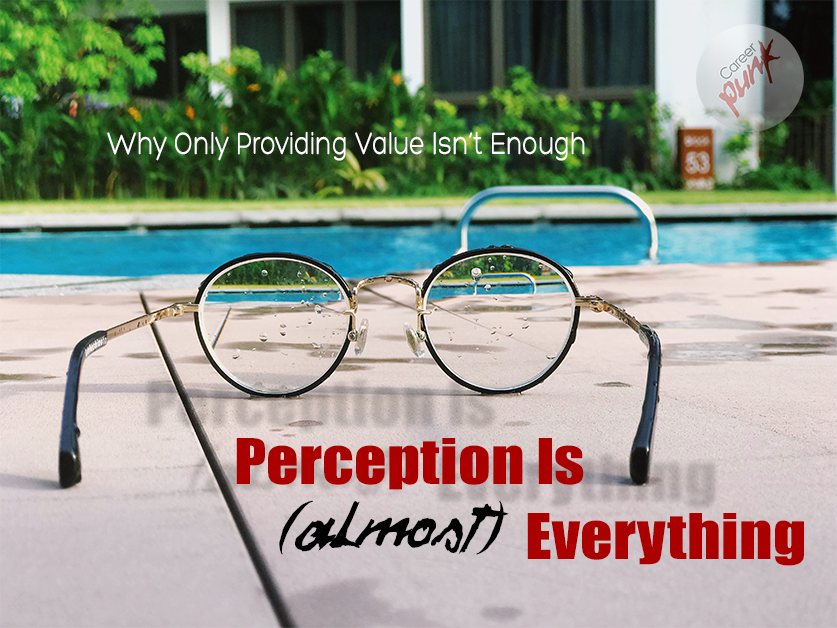Perception is real, even when it is not reality.
-Edward De Bono
The other day I had a conversation with a contemporary who disclosed a recent firing at her company. The ousted employee had been with the firm for sometime, playing a role in its growth and the transition to multiple offices. When asked why her coworker was let go, she wasn’t aware of any details just that it was a shock to many.
“What did your departing colleague do,” I asked.
She replied simply, “They were Director of Creative.”
“That’s a job title. What did they do?” I asked again.
“Well, I’m not sure exactly…” My friend then began explaining the former employee’s long tenure with the company, how they had been a big hire for Marketing early on, and that the sudden exit was so unexpected.
“Why?” I asked. Silence.
Let me pose that question another way,
If a tree falls in the forest, makes $1M on the way down, but no one’s around to hear it, how much is that tree worth?
The answer: “What tree? The Forest is worth $1M!”

The key here is perception. Perception plays a huge part in your professional success. The issue my friend clearly outlined was that her Director of Creative was certainly known amongst the company but awareness alone does NOT translate to value. I honestly don’t know why that person was let go, it could have been a number of things but anyone facing being fired is surely fighting an uphill battle if they can’t also show how they’ve specifically brought value to their team, dept., and/or organization.
Sure some teams get all the glory (i.e. Sales, Marketing, etc.) but those teams are often successful in part due to the many facets of support and ingenuity the other aspects of a company provides. A bit of wisdom I heard long ago went something like…
“If you want more visibility, be as close to the company’s bottom line as you can.”
The example I’ll use here is ‘sales.’ A Sales rep is as close to the bottom line as you can get. The specific role of a Sales rep is to bring in money to the business. Guess what the purpose of 99.99% of businesses is: to make money. (Sure there are many other reasons too; to help people, to solve a problem, to provide convenience, etc. But unless you are a charity, making money is apart of the goal.)
For a Sales rep, perception is easy, basically built into the role. Their value is clearly defined and measured ($$). Most teams are built upon monetary goals or quotas. At the end of each day, month, quarter, or year a sales individual can easily equate their efforts to the value they directly provide to the company. And when that value translates directly into dollars, the perception is clear.
But what if I’m not a salesperson and my job duties aren’t that close to the company’s bottom line?
Providing value is not enough. You must also champion it and others’ as well. Perception is as only as accurate as what is perceived. If no one hears the tree, who’s to know that it fell. Practice sharing your wins and be proud of your work. Pride, however, does not mean ego and a part of sharing means seeking feedback for improvement. This isn’t just advice to avoid getting fired, these habits are consistently found in top performers and employees seeking a promotion.
 Consider this, a committee has gathered to discuss yours and your coworker’s future at the company. Maybe there is only room for one to get promoted or perhaps the company is downsizing and the group must decide on which of you to keep. One of you has done your job reliably and never caused a fuss while the other sends out monthly updates on current projects and the steady progress of each. You both are completing the requirements of your role and perhaps even your overall performance is similar. Who gets promoted and who loses their job?
Consider this, a committee has gathered to discuss yours and your coworker’s future at the company. Maybe there is only room for one to get promoted or perhaps the company is downsizing and the group must decide on which of you to keep. One of you has done your job reliably and never caused a fuss while the other sends out monthly updates on current projects and the steady progress of each. You both are completing the requirements of your role and perhaps even your overall performance is similar. Who gets promoted and who loses their job?
Goodbye ‘quiet and reliable,’ and congratulations to Ms. Monthly Updater! “Just look at all the projects she’s doing,” they’ll say. “And she’s been making progress too!” The committee is able to have a conversation about the latter employee simply because they’ve been given something (positive) to talk about. And from that conversation comes the perception of a reliable worker who is organized, a go-getter, and clearly provides value to the business.
If you’re not already aware of how you’re perceived at work, its time to prioritize your awareness and actively contribute to a positive perception.
Below are a few things you can do to improve and maintain the way you’re perceived at work:
- Provide Value – Do your job well, and then some.
- Share Your Wins –
- Did a customer compliment you? Forward to your boss!
- Did you complete a task in record time? Explain the process with your team.
- Learn something new? Publicly commend the person that taught it to you.
- Champion Others – Everything above, but by spotlighting a colleague.
- Seek Feedback – Present the perception of constant improvement by always soliciting constructive criticism.
- Be Positive – Negativity is the easiest way to ruin how you’re perceived at work. Smile 🙂
- Remember & Remind – Don’t be afraid to tell your boss about your last challenge, how you improved or how you still need to. Also remember to include others that have supported you.
- Say “Yes” – To every learning opportunity, new project, or chance to help out a coworker.
- Dress the Part – No tank tops to the board meetings.
- Talk to People – The more people you engage with, the more opportunities you may discover where you can provide value.
Join our Newsletter Underground and get my FREE Guide
click link below
“5 Things You Can Say To Your Boss Tomorrow To GET NOTICED!”








Perception is reality in the eye of the beholder. How a person perceives things is their reality. Always keep this in mind whether communicating in writing or verbally. Your bullet points on improving the way one is perceived are spot on!
JM
Thanks John! Can’t agree more. First impressions are notoriously determined within the first 90 seconds of meeting someone. And perception at work goes far beyond that initial minute and a half. Being mindful of the beholder’s reality also means staying aware of how you perceive your own. Glad you found the article on point.